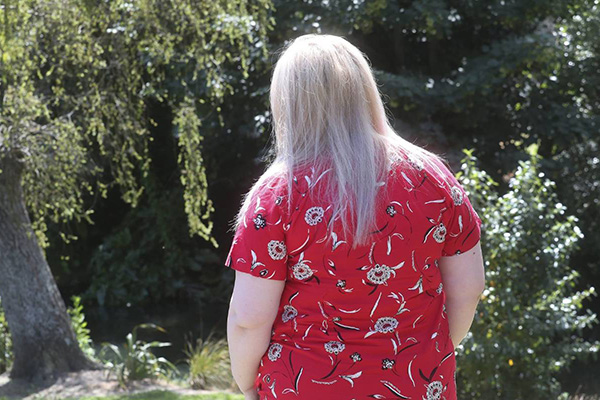
This story was first published in November 2019, after a jury found Jesse Kempson guilty of the murder of Grace Millane.
At times, it looked like an enlightened step forward for sexual violence justice – a trial for the post-#MeToo era if ever there was one. At others it felt, in the words of one veteran court reporter, like a 1990s rape trial.
In three weeks of testimony and cross-examination, the jury of seven women and five men in the Grace Millane murder trial were asked to gaze deep into a double-sided mirror; one surface reflecting sexual empowerment and the freedom of young women in the new millennium to ask for what they want without shame – and the other, laying out Grace’s entire sexual history for hints she was, at least in part, culpable for what happened to her that December night.
Alison Mau, editor of Stuff’s #metooNZ project, was at court throughout. The trial was an entanglement of modern attitudes to sex, versus the ‘dangers’ of hook-up culture, and each narrative played a part in how we remember the violent death of an evidently kind, caring, beautiful young woman on the trip of a lifetime.

“Jurors are judges – judges of facts.”
It’s day one, and with measured pace Justice Simon Moore lays out the landscape for the jury.
The facts these 12 people will weigh in this case will be how, when and why British backpacker Grace Millane died in a rented Queen St apartment last summer.
The jury is chosen without much fuss – there is hardly a challenge from the benches of either prosecution or defence – but Justice Moore has a caveat the jury pool might not have expected.
Jurors won’t be allowed to weigh the facts in this trial, he says, unless they can be absolutely impartial. That meant anyone who attended a vigil or a march after Grace’s body was found in a suitcase in the West Auckland bush last December must identify themselves, and face dismissal.
It is one of the first things reported by the swollen ranks of local and overseas media filling the courtroom, and the first potential red flag for people following the coverage. Online, there is already pushback. Why would publicly showing concern about violence against women mean you cannot be a juror, they ask?
Within days, the talk on Twitter will turn to other issues. Does a blood alcohol level of twice the legal driving limit have any relevance to what happened to Grace? Why are the lawyers constantly referring to the “Tinder date” – it’s just a date surely? They ask each other how the manner of Grace’s meeting with her killer can possibly affect the outcome – unless it’s designed to present her as taking risks, perhaps?
The jury is not reading any of this online chat, they are forbidden from accessing coverage of the trial at all. But when the next hearing day dawns, one thing becomes clear.
This will be a trial about sex. Sex between two consenting people that ended in tragedy, according to the 27-year-old defendant’s legal team. And according to the Crown; knowingly lethal sex including strangulation that left Grace on the floor, bleeding from the nose and without help or mercy.
The jury will hear much, much more about sex as the days go by.
“She Asked Him to Do It”

The very first piece of evidence to be introduced in the trial is a statement from Grace’s father, David.
Each day, he and his wife Gillian file into the courtroom with members of the police team, led by Detective Inspector Scott Beard, and sit slightly to the left of centre in the front row of the public gallery. The hordes of strangers filling the rest of the seats stand silently to let them pass each time; eyes averted to the floor rather than at the Millanes.
David Millane watches as his words are read to the court by prosecutor Robin McCoubrey.
Her name was Grace Emmie but they often called her Gracie. She was their youngest child, got on well with brothers Michael and Declan and was particularly close to her mum. She was in touch at least every other day on her travels and sent her family a final picture of the Christmas tree underneath the Sky Tower on December 1, the night she died. She was due to return to England in June 2019 in time for a family wedding. It was to be her 22nd birthday on December 2.
Millane’s statement says he doesn’t know whether his daughter used online dating apps, but he knew that seemed to be how young people meet each other.
“Children don’t tell their parents everything, and nor should they,” the statement ends.
By the time prosecution and defence wrap their cases 16 gruelling days later, knowing everything about Grace has become a focal point of pain for the family, and anger in the wider community. Gillian Millane is said to have asked why it seemed her daughter was on trial, rather than the accused.
In a trial centred around how a young woman died during a sexual encounter, it would be impossible to avoid the subject of sex altogether.
The jury is told repeatedly by the defence that they must concentrate on what happened in that CityLife hotel room on the night of December 1.
Indeed, when opening the defence case, lawyer Ron Mansfield repeatedly tells the jury this trial is not about the blaming and shaming of Grace Millane.
On the other hand, the defence also spends swathes of time examining Grace’s past sex life, revealing her preferences, and what she would do in the bedroom with ex-partners. These things are relevant, defence counsel say, because it shows Grace died as a result of consensual sex gone wrong.

I’m not interested and you shouldn’t (be) either in this concept of normal or what it means, I suppose, in this trial, whether sex was normal or kinky.
“The issue is whether the conduct complained of was unlawful or not. Those words 'shame and blame' which are used as a tool by that conservative element to keep us within the confines of normal, or I suppose are used as weapons to keep us within the confines of normal, need to be put aside by you.”
But the bold claim sits uneasily with the framing of the defence’s case, which rests mainly on the premise Grace asked the accused to put his hands around her neck – “breath play” – during sex in that room. She asked for it.
The inference is that Grace was at least partially culpable for what happened to her. This is an example of the kind of victim-blaming culture experts say puts survivors of sexual violence off coming forward. If Grace Millane’s reputation can be so thoroughly picked over, without her being able to defend herself, what hope is there for anyone else?
As a young woman embracing her sexuality and testing her own tastes and preferences, Grace had nothing to be ashamed of. There are many people who will still see any kind of “kinky” practice (or anything other than sex in the missionary position) as weird or abnormal – an idea seemingly not lost on the defence team.
There is overwhelming anecdotal evidence that dating is now carried out mostly via apps including Tinder, Bumble and Whiplr, and Generation Z is completely unashamed about their dabblings in forms of sex their parents’ generation might never have tried.
However, society is unwilling to let go of stereotypes easily, and there is still an undercurrent of suspicion around female sexuality.
There’s a tension here that even the experts find tough to reconcile.
“It’s slippery,” says Auckland University gender and sexual politics Professor Nicola Gavey, nursing a coffee in the lunch break at the high court.
“It’s that very modern paradox where women are simultaneously expected and encouraged to be sexually agentic – and then if they are, they are negatively judged, shamed and punished if something goes wrong.”
Gavey says it’s not that Grace would have anything to be ashamed of in the information the defence has produced; but the excruciating amount of detail is a violation nevertheless.
“Isn’t it a private thing?” she asks.
If she’s dead, whose right is it to take that part of her life and publicly spread it around? If she wants to talk about it that’s her choice, but to drag out the details of her intimate life like that?
Researcher Jess Berentson-Shaw says she found it hard watching the defence use “every dominant and shallow narrative” about sexual violence to trigger prejudices and misconceptions about sexual violence.
“That particular narrative is very much about individuals; individual women making choices, bad choices, and them essentially being responsible ... which ultimately contributes to a culture in which people don't think very productively about sexual violence.
“The attempt to draw attention to the alcohol is also just layering that cake, so to speak.”
Strangulation, BDSM and the Porn Problem

What he has described to the police is a possible mechanism which would result in death and it’s a mechanism which can occur within a consensual sexual relationship between two partners who decide and agree to engage in it.
As New Zealand attempts to get control of a runaway issue with intimate partner violence, non-fatal strangulation has emerged as its most serious marker – the one thing more than any other that can foretell a subsequent killing. Victims who’ve been strangled are seven times more likely to eventually die at the hands of their partner or ex-partner.
Until December 2018, strangulation was not a stand-alone offence, instead rolled into the Family Violence Act with a number of other forms of assault. When the Act was amended, the floodgates opened.
A man was in court on charges the very day the legislation was enacted. By September this year, the average number charged with strangulation had risen to almost six a day.
At the time, Womens Refuge Chief Executive, Dr Anj Jury, said strangulation was so common many victims neglected to even mention it.
“They talk about, ‘Oh, he held me on the bed with his arm across my throat and I couldn’t breathe,’ or, ‘He held me up against a wall and I couldn’t breathe’.
“And they didn’t necessarily recognise that actually if they couldn’t breathe they were actually close to becoming a homicide victim.”
Experts in BDSM (bondage and discipline, dominance and submission, and sadism and masochism) say strangulation that can kill, maim and terrorise is a world away from consensual “breath play” – the kinky sex practice that’s gaining favour with increasing numbers of both men and women.
But the two practices – one intended for pleasure, one for terror – crossed paths several times in the course of the trial.
The doctor who conducted her post-mortem examination found Grace died from pressure to her neck and that there were bruises on her body consistent with restraint injuries. He cited research that showed deaths from sexual asphyxiation, as opposed to other forms of strangulation, are incredibly rare.
Dee Morgan is a professional counsellor who works within the BDSM landscape. She says the only deaths she has ever heard of in that sphere have come from auto-erotic asphyxiation, which takes place alone, not with a partner.
Morgan says while “breath play” is at the more dangerous end of BDSM practices, informed use of it would never include strangulation. Also, there are many forms of breath play, most of which do not involve placing hands around the neck at all.
She says Grace and her former partner, whose statement was read in court last week as part of the defence’s case, appeared to have done their homework and were “playing with the RACK system” – which stands for Risk-Aware Consensual Kink – that constitutes safe practice.
“If (they) had safe words and safe gestures such as a tap-out ... they were clear on the potential harm of what they were engaged in, and they mitigated it to the best of their ability.
“If the breath play has not been explicitly consented to, it’s not sex – it’s assault.”
Both prosecution and defence used CCTV footage of Grace and her murderer to help make their case for what took place on the night of December 1.
Both prosecution and defence used CCTV footage of Grace and her murderer to help make their case for what took place on the night of December 1.
Morgan says it’s true the blockbuster erotica book and film, 50 Shades of Grey, has had an “unavoidable” effect around the world, and it has been a problematic one.
“If people only know about BDSM through 50 Shades then they’re missing a lot of the consent, the negotiation (collaboration, in this context), and the nuance that comes with kinky culture.” says Morgan.
The power dynamic in the book is almost diametrically opposed to any kink or BDSM you’ll see in the ‘real world’, says Morgan, where the focus is on ensuring that everyone is enjoying what they’re doing, people are not being coerced or abused, and “where the power exchange is about exchange”.
There’s another part of the defence case in Grace’s trial that Dee Morgan finds problematic – the link made between experimental sex and the rise of dating apps.
“I see relatively little connection between the two. Dating apps are simply a popular way of meeting for some people, just as bars and clubs used to be and still are, in some instances. While it can short-cut the ‘getting to know you’ process, dating apps do allow for the ability to be more upfront about what you’re looking for.”
She is much more concerned about pornography.
“There is a lack of awareness by viewers that people who appear in porn are, practically speaking, stunt performers. Porn stars generally have ... practice and experience, and engage in a lot of preparation and discussion which goes on off-screen.”
Unclear, or completely absent education about what porn is (intended for arousal and to make money) and what porn isn’t (accurate in its depictions of bodies and sexual practices) means young people are getting bad information and taking that into their sexual interactions – including casual sex with people they’ve met on dating sites.
“Rough sexual practices without gaining consent first seem to be incredibly common right now, which is really concerning.”
During Grace’s trial, a male defence witness in his late 20s, who met Grace while booking her travel around New Zealand (but whose name was suppressed by the judge), admitted he “usually” puts his hands on the throats of his sexual partners without asking first.
“They usually enjoy it,” he replied, when lawyers asked him why.
The Rough Sex Defence

It’s not difficult to draw a line between the miseducation of a generation via porn, and goings on in the justice system – and the connection is a cause for alarm.
In the UK, an online campaign called We Can’t Consent To This was set up in December to highlight the rise in murderous men using “rough sex gone wrong” as a defence. The campaign found 59 such cases in the UK in recent years. It says the defence has worked in six of the fourteen cases which reached trial.
In those cases, the man was either found not guilty, or was convicted of the lower-level crime of manslaughter. It says this is a worldwide issue with the defence being used in cases in Germany, Canada, Spain, Portugal, Mexico, Australia, Sweden, the US, Ireland – and now New Zealand.
The families left behind often say that even when a jury sees through the ruse and hands down a conviction for murder, the sense that the victim was somehow to blame lingers, always associated with the memory of their loved one.
“He took away Vicky, her choices, her chances, her future,” says the sister of 25-year-old newlywed Vicky Wynne-Jones.
“And then he took her dignity.”
Although this is a phenomenon on the rise, it’s not a totally new thing. The 1986 “Preppy Murder” in Manhattan’s Central Park led to a failed push to outlaw the rough sex defence altogether.
George Buzash, who was at the time a Doctor of Law at Northwestern University, wrote in the Journal of Criminal Law and Criminology in 1989: “[The] rough sex defence in murder cases has the potential to become the updated version of the ‘she asked for it’ defence and a formidable obstacle for prosecutors trying to secure a murder conviction in a homicide involving a male offender and a female victim”.
He advocated for a “strict liability approach” which would in effect, abolish the use of this defence. Instead, the We Can’t Consent To This campaign’s research has found a 90 per cent jump in the use of rough-sex-gone-wrong in the past decade.
Berentson-Shaw can see why it’s so attractive for a legal team looking for way to get keep their client out of jail.
“[It] draws on people thinking that only “normal sex” is okay, and it is womens’ job to keep themselves safe, not society’s job to make sure women who enjoy rough sex don’t die.”
The Witness

What is propensity evidence?
Propensity evidence is defined as evidence which attempts to show the defendant is bad, because he or she has behaved badly before.
It is not well-liked by defence lawyers who sometimes suspect juries use it as a lazy way to confirm their suspicions that if the defendant has behaved badly before, they’re likely to do it again – without weighing the facts properly.
Propensity witnesses can also be called to suggest patterns of behaviour in the complainant or victim – and in the Millane case, both happened. Three witnesses, all of whom were given name suppression, were called by the prosecution to try to prove the accused had an interest in choking sex partners, or had tried to asphyxiate women before. The evidence of another three people was used in an attempt to prove Grace Millane was interested in being choked during sex.
Under New Zealand law, in a case of sexual offending no evidence can be given and no question can be put to a witness relating directly or indirectly to the sexual experience of the complainant, with any person other than the defendant, except with the permission of the judge.
The killer was first interviewed on December 6, when he gave a fabricated story to police about saying goodbye to Grace on Victoria St after their date.
The killer was first interviewed on December 6, when he gave a fabricated story to police about saying goodbye to Grace on Victoria St after their date.
The witness the court broke
One of the prosecution’s star witnesses was called to give propensity evidence, and although her name is permanently suppressed, her time on the stand will not easily be forgotten by anyone in the courtroom.
The young woman told the court she had “matched” with Grace’s killer on Tinder. Instead of the promised “drink in the city” the woman told the court he steered her straight to his apartment.
As he filled and refilled her glass, the man told her how much he loved her, she said. What followed was, according to the witness, a terrifying physical struggle in which she almost lost her life.
But defence counsel argued her account was a complete fabrication.
The witness described in detail how the killer used part of his body to cover her face, so she was unable to breathe, while he pinned her to the bed.
She told of kicking violently to free herself but her arms were restrained. As agonising seconds ticked by, she changed her approach, lying motionless in the hope that he would realise and get off, before kicking and wrestling again.
“I couldn’t move and I couldn’t breathe,” the woman said.
“I thought, 'this can’t be the way that I die'.”
Close to four hours of cross examination followed. It was brutal – at least for the witness, who broke down repeatedly, moving through polite compliance, confusion, anger and eventually to tears as the grilling continued.
She had been frightened of him, she said – scared that the things he’d told her about his family, and what he knew about her life and her movements would leave her in danger. So, once she walked out of that apartment alive, she decided to string him along – keeping in touch but never intending to meet.
But defence lawyer Ron Mansfield was relentless and led the witness through hundreds of messages sent between her and Grace’s killer in the weeks after their date, suggesting she’d made up the story because she was embarrassed about seeking a relationship with a man who was now accused of murder.
“I don’t know how many times you can ask me the same question,” the witness said with a hint of desperation in her voice.
Witness: I didn’t want to see him again.
Counsel: Didn’t want anything to do with him at all?
Witness: No. I wanted him completely out of my life.
“I was not into him, I never wanted to see him again, I don’t know how many times I can explain that I ... yes I was leading him on, but I was scared that if I just cut ties, some of the scary s… he was saying, he was just going to turn up.”
By the end of the cross-examination, Mansfield had done his best to convince the jury the woman had lied about her near-death experience in the room at CityLife. He had demanded she relive the sex act, and the alleged attack, in excruciatingly explicit detail several times. It left the witness sobbing.
This is, by a long way, one of the most difficult scenes in the Millane murder trial to unpick. Mansfield and his lead counsel Ian Brookie were simply working within the confines of the way the adversarial criminal justice system operates; the evidence must be tested, and the accused must be defended to the best of his or her lawyers’ ability.
But the level of trauma experienced by witnesses and complainants in such cases is becoming increasingly scrutinised. A Bill before Parliament right now will tighten the rules on how much, and in what manner, complainants are permitted to be questioned.
Nicola Gavey watched the exchange from the public gallery, and says it showed how little men understood of the dangers women face.
“I found that attack on her really effective at making hay out of ignorance about the reality of womens’ experience of sexually dangerous situations, by not being able to put himself in her shoes, by having this unfiltered masculine [view] of what he would have been able to do in that situation,” Gavey says.
She felt the witness's fear her assailant would just “turn up her life” if she cut him off cold, was a realistic one, and one other women will have experienced, too.
“Whether it was the best strategy? It was one of the only strategies available to her, and it probably came at great personal cost.
“She did say she was ashamed that she got herself in that situation of risk in the first place. That was a very understandable response in a victim-blaming culture that expects women to keep themselves safe.
“That’s certainly one way victim blaming has crept into this trial – the idea that it is your responsibility to keep yourself safe.”
The movements of Grace’s murderer in the days after her death were characterised as “panicked” by defence and “cool as a cucumber” by the prosecution.
The movements of Grace’s murderer in the days after her death were characterised as “panicked” by defence and “cool as a cucumber” by the prosecution.
She Didn’t Ask For It

Ultimately, the ‘She asked for it’ strategy failed to convince the jury. After a little more than five hours of deliberations, the forewoman returned a unanimous guilty murder verdict.
Grace’s killer will at some point be named, and will be locked away for at least 10 years before he’s able to be considered for parole. His exact fate will be handed down in sentencing on February 21 by Justice Simon Moore.
For a decade at least, women will be safe from his terrifying brand of domination, abuse and violence.
The Millane trial has sparked a tide of feeling in the community that the way justice works in the courtroom is not good enough. In trials involving sexual violence the process hurts many more than it needs to, the experts say. The witnesses called for this trial would no doubt attest to that.

The parents of Grace Millane, David and Gillian Millane, arriving at the Auckland High Court.
The parents of Grace Millane, David and Gillian Millane, arriving at the Auckland High Court.
So might the Millanes. After the verdict, David Millane’s words to the media spoke eloquently of the trauma he and his wife Gillian felt sitting through the trial each day, hearing evidence about their daughter that seemed to have little import other than to lay her life bare.
Millane struggled to hold back his tears, and among his final words was a truth everyone watching will have felt in their gut.
“She did not deserve to be murdered in such a barbaric way on her gap year.”
David and Gillian Millane remain devoted to raising awareness and funds for the White Ribbon cause - including “Love, Grace” handbags filled with toiletries and luxuries - for their local domestic abuse charity, and the ‘Grace’s Ribbon’ bracelet available worldwide.

Words Alison Mau
Visual Journalists Lawrence Smith, Jason Dorday and David White
Design Kathryn George
Development Suyeon Son
Editor Chloe Hubbard









